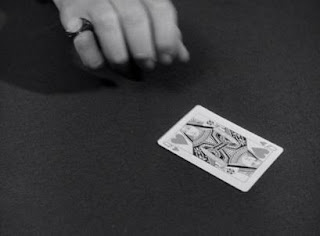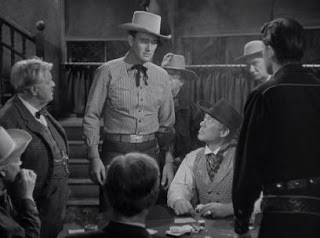Poker, John Wayne, and Law and Order
 Tall in the Saddle, a fast-paced and entertaining Western from 1944 starring John Wayne, contains most of the elements one finds in “horse operas” of the era, with a complicated plot punctuated by stage coaches, saloons, and shootouts. It also includes poker in an early scene that introduces how Wayne’s character, the independent Rocklin, represents the keeper of order amid the lawless Old West.
Tall in the Saddle, a fast-paced and entertaining Western from 1944 starring John Wayne, contains most of the elements one finds in “horse operas” of the era, with a complicated plot punctuated by stage coaches, saloons, and shootouts. It also includes poker in an early scene that introduces how Wayne’s character, the independent Rocklin, represents the keeper of order amid the lawless Old West.We first meet Rocklin arriving at Garden City by train, then catching a coach to Santa Inez. The driver, Dave, is played by frequent sidekick George “Gabby” Hayes, who carries Rocklin -- or “Rock,” as Dave calls him -- as well as two women, the pretty blonde Clara Cardell (Audrey Long) and her mean-spirited aunt Miss Martin (Elisabeth Risdon).
Dave and Rocklin engage in conversation along the route, with one topic being Dave’s boss, Harolday, whom he dislikes.
“He’s too darn sane, believing in law and order,” says Dave of Harolday between swigs of whisky. “What’s wrong with law and order?” asks Rocklin. “Well, it depends on who’s dishing it out. I never was much on taking orders myself, and as for the law... heh... you’ll find out what that means around these parts.”
Dave’s words are confirmed even before the group reaches Santa Inez in a sketchy scene that shows law enforcement to be corrupt. Stopping over for a bite to eat, Dave ends up offending the sheriff -- calling him a “four-flusher” (among other accusations) -- and as a result gets pistol-whipped into unconsciousness.
 Once they arrive at Santa Inez, Rocklin gets Dave some medical attention, then joins a poker game at the Sun-Up Saloon.
Once they arrive at Santa Inez, Rocklin gets Dave some medical attention, then joins a poker game at the Sun-Up Saloon.The game includes several players, including Clint Harolday (Russell Wade), the stepson of Dave’s boss who runs the Topaz ranch, and another named Judge Garvey (Ward Bond). Clint has been winning, they warn Rocklin, and soon enough he and the young gun get involved in a contentious hand of five-card draw.
After the deal, Rocklin opens for $3 and Garvey folds. Clint then raises to $20, forcing the others out. “Call you for six,” says Rocklin, referring to the last bills he has left on the table. “Dig,” says Clint, indicating Rocklin should go into his pockets to produce enough to call the raise.
Garvey reminds Clint they are playing table stakes, but Clint objects. “Not if he wants to dig,” he says with a sneer, and Rocklin does just that, saying “I got you beat” as he puts out the money to call.
 Each player then draws one card, with the card delivered to Clint -- the
Each player then draws one card, with the card delivered to Clint -- the  -- being accidentally exposed. He quickly picks it up and fits it into his hand, grinning widely as he does.
-- being accidentally exposed. He quickly picks it up and fits it into his hand, grinning widely as he does.“That queen is dead,” says Rocklin evenly. “I can take it if I want it,” Clint responds. “Sure, if you want,” says Rocklin, still calm. “But you gotta beat my hand with four cards,” he adds. “I’m playing these mister,” says Clint defiantly, ignoring Rocklin’s insistence upon the rule regarding the exposed card.
There’s a pause as they look around at the others, and Judge Garvey suggests they consider splitting the pot. “I’m not splitting,” says Clint with a smile. “I’m betting.” He then puts the remainder of his stack of bills in the center. “You calling?”
“Nope,” says Rocklin, and Clint begins to reach for the pot. Then Rocklin interrupts him. “I’m raising,” he says, putting the rest of his money forward. Clint’s face droops.
 “Dig,” says Rocklin.
“Dig,” says Rocklin.Clint asks another player for more money, but when he refuses Clint says “I’ve called for all I’ve got” and turns over his hand. “Full house,” he says proudly, but Rocklin ignores him.
“Kings up win,” says Rocklin. “That third queen is dead.”
As Rocklin starts to drag the pot, Clint rises up and draws his pistol. “Get away from that table and get out of here,” he says. “Maybe from now on you’ll know a full house beats two pair, you four-flusher,” again using that great old term frequently used in hard-boiled fiction, too.
Rocklin quietly leaves, walking up the stairs to his room above the saloon. As Clint gathers the money, it is reiterated to him how the exposed card was in fact dead.
“When anybody plays poker with me they play my game or not at all,” says Clint. They warn Clint that Rocklin is coming back, but he doesn’t believe it. But of course, Rocklin returns, now sporting a full holster.
“I’ve come for my money,” he says, and Clint immediately relents. “Sure,” he says quickly. “I guess I was wrong about that queen,” he continues, but Rocklin isn’t listening. Instead he deliberately gathers the bills and bids the men good night.
 The scene supports Dave’s earlier observation about “law and order.” There are rules, sure, but not everyone cares to follow them, and ultimately what really matters is whether or not someone is willing and powerful enough to enforce the rules.
The scene supports Dave’s earlier observation about “law and order.” There are rules, sure, but not everyone cares to follow them, and ultimately what really matters is whether or not someone is willing and powerful enough to enforce the rules. The scene also positions Rocklin as willing to take on the responsibility, which, as you might imagine, becomes very needful once he gets more deeply involved in the ranch wars happening in Santa Inez.
There’s more reference to poker in the film, including an interesting back story involving Judge Garvey and the ranch owner Red Cardell, the latter having been murdered three weeks before Rocklin arrives. The pair were friends -- poker buddies, in fact -- although Dave tells Rocklin a tale that suggests Garvey might have been cheating Cardell with a marked deck of cards and Cardell found out (thus making Garvey a possible suspect in Cardell’s murder).
The deceased Cardell gets compared to Rocklin more than once. Harolday refers to him as being “too fond of taking the law into his own hands” (not unlike Rocklin). Dave also speaks fondly of Cardell, calling him the “salt of the earth” and noting to Rocklin how “he was a big feller... tall in the saddle, like yourself.”
Dave even thinks Rocklin “could pass as a blood relation” -- a bit of foreshadowing, actually, as later we’ll learn that it wasn’t a coincidence that Rocklin came to Santa Inez so soon after Red Cardell’s murder.
I won’t delve into the complicated plot or the love triangle that predictably develops between Rocklin, Clara, and the tough cowgirl brunette Arly Harolday (Ella Raines), but instead just recommend the film as an engaging ride with Wayne and Hayes both delivering solid performances.
 I’ll also add that Tall in the Saddle integrates poker well into the story, neatly using the game to introduce both Rocklin’s character and themes that are relevant to the film.
I’ll also add that Tall in the Saddle integrates poker well into the story, neatly using the game to introduce both Rocklin’s character and themes that are relevant to the film. The scene additionally gives us an idea of what poker still signified in America, circa the 1940s, namely, a potentially dangerous activity in which ideas of right and wrong -- or law and order -- are frequently challenged. Such a judgment of poker is delivered succinctly in a brief exchange between Harolday and Rocklin the day after the game.
“Mr. Rocklin, what happened between you and my stepson last night?” asks Harolday.
“Poker,” says Rocklin.
“Oh,” replies Harolday with a nod. No other explanation is needed.
Labels: *the rumble, film, John Wayne, Tall in the Saddle














2 Comments:
Great review. I'm a fan of The Duke and will definitely be looking to add this to my collection.
Thanks, Herb. I mostly focused on that poker scene here, but there's a lot else that's great in this one, too -- incl. several cool scenes with Wayne, Gabby Hayes doing his thing, and Ella Raines is great as Arly.
Post a Comment
<< Home